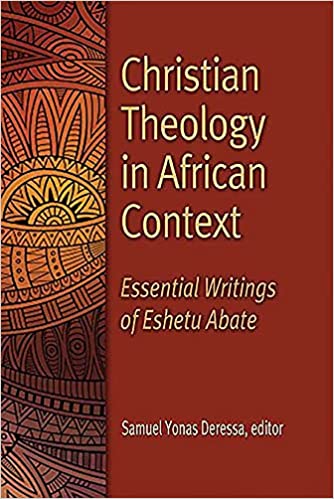A Book Review from Books At a Glance
by Abeneazer Urga
In the opening chapter, Deressa introduces Eshetu Abate—the late Ethiopian Lutheran theologian—who contributed immensely to the theological endeavor in Ethiopia and beyond through his writings and pastoral ministry.
In the first essay, ‘The Church, Culture, and Ethnicity: A Theological View,’ Eshetu locates the church in various cultures and ethnicities. He argues that the ministry of Jesus and his disciples has given us the blueprint for relating to any culture or ethnicity. Eshetu—following Bruce Milne—explains that the church has four major characteristics: unity, holiness, universality, and apostolicity. Culture is unique to humanity.
Ethnicity is the shared identity among people that make them distinct from other people. Following Jesus’ and Paul’s examples, the church should embrace the incarnational model in interacting with cultures and ethnicities. Whereas the incarnational model confirms the culture of the people we are ministering to, the transformation model enables us to critique some facets of a culture that contradict the gospel message.
The second essay addresses ‘Human Sexuality and AIDS.’ Eshetu asserts that the Bible teaches that there are two distinct sexes and that sexuality is God’s gift. He also lays out Christian sexual norms: maturity is vital for sexual relationships, sexual relationships should occur among two opposite sexes, and sex outside of marriage or adultery is contrary to God’s design. It could bring about significant problems in every aspect of life, one of which is sexually transmitted diseases.
The Ethiopian Lutheran Church promotes ministry to the whole person, caring for issues like HIV/AIDS. The church is committed to teaching about healthy sexuality, the importance of viable marriage, and caring for those who live with HIV/AIDS. Eshetu underscores how to provide pastoral care for those affected by AIDS. This pastoral care should entail emotional, physical, theological, and social support.
In the third essay, ‘The Battle for Justification by Faith in the African Context,’ Eshetu narrates the theological battle between the Ethiopian Orthodox Church (EOC) and Ethiopian Protestants over justification by faith. While the EOC propagated the need for faith and good works for one’s salvation, the Protestants insisted that justification is by faith alone. Eshetu also points out that the doctrine of justification by faith alone is in jeopardy among Protestants.
In the fourth essay, ‘The Theology of the Cross in the African Context,’ Eshetu argues that the cross is vital in the African milieu. For instance, the cross of Christ has enabled many Africans to overcome malevolent spirits. Sacrifice is common in the African religious terrain. Africans have welcomed the practices of sacrificial rituals, which have served as preparatio evangelica. Consequently, Africans have embraced the cross and Jesus’ substitutionary death without surprise. Africans also understand that the cross has socio-political implications. By pointing to the celebration of the Eucharist, Eshetu insists that the Lord’s Table is the greatest equalizer of people.
Eshetu stresses imitating Jesus and identifying with those in need to bring about change. He contends that an act of ‘self-giving’ love should accompany the proclamation of the word. The cross provides the means to reconcile with God and helps to identify with the disenfranchised and to resist every social ill and injustice. The cross of Christ is vital to bring about conciliation between various ethnicities and tribes.
The fifth essay, ‘Confessing Christ in the Apostles’ Creed,’ asserts the apostolic origin of the Apostles’ Creed, focusing on the second article of the Apostles’ Creed and explicating the portrait of Jesus as described in the Apostolic Creed. The final essay, ‘Christian Faith in the New Millennium,’ shows concern for the ‘[c]continuity in the apostolic faith and concern for each other, especially the poor’ as we wait for the Second Coming (p. 99).
Eshetu contends that the gospel does not change over time. As such, it should continue in the millennium without adulteration. There is indeed a need for the contextualization of the faith in every generation, but the content must remain the same. One area that should always remain the same is the supremacy of Christ and the authority of God’s Word. Mission to the lost through proclamation and love in action among the poor are the two significant characteristics of the apostolic faith.
This volume is invaluable as it gives us a window into the theological mind of an influential Ethiopian theologian as he wrestled with theological issues in Africa, especially in the Ethiopian context. As his fellow theologian Rev. Gudina Tumsa and many African theologians did, Eshetu emphasizes the importance of serving the whole man. His essays also reveal that Christ is the hermeneutical key for his holistic theological and missiological reflection. Nevertheless, Eshetu is less ecumenical. At times, he presumes that his denomination in Ethiopia is the only one that adheres to justification by faith alone.
As is seen in the work of many Western scholars, there is an implicit assumption in Eshetu’s writings that the doctrine of justification by faith began in the sixteenth century with Martin Luther. Regardless of these minor issues, this volume—along with his other works—will help in examining the theological reflection and contribution of Eshetu Abate.
Abeneazer Urga
Buy the books

CHRISTIAN THEOLOGY IN AFRICAN CONTEXT: ESSENTIAL WRITINGS OF ESHETU ABATE, edited by Samuel Yonas Deressa